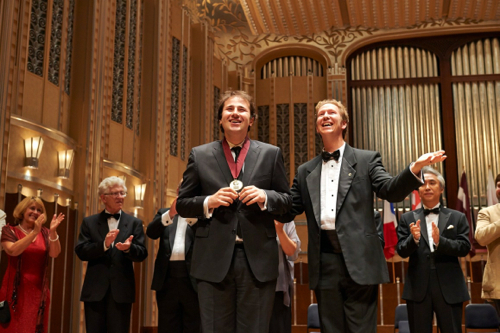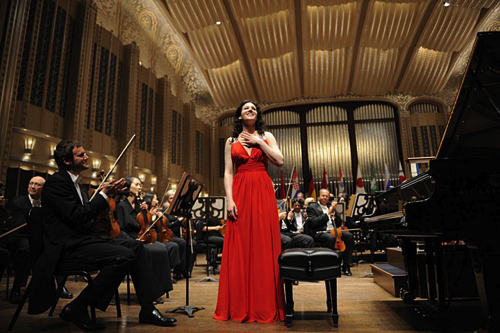Between the middle of June and the first week of August, I attended major classical music competitions in Montréal, Indianapolis, Fort Worth and Cleveland. Three were for piano, one was for the violin. In the end, it was two titanic performances in the concerto finals, with the participation of perhaps the country's greatest orchestra and hall combination, which separated the Cleveland International Piano Competition from the rest of the pack, although the Montreal International Violin Competition came in with a strong, dramatic second.
Cleveland International Piano Competition Gold Medalist Stanislav Khristenko with executive director Pierre van der Westhuizen. Photo by Roger Mastroianni
There's no denying the entertainment value of high-level classical music competitions. They come pre-loaded with a 24/7 soundtrack of the most 50 Shades of Grey, romantic music ever written. Sure, competitions are barbaric but so is the Super Bowl. And none of the contestants can say they're innocent to the pain and cruelty that are served up regularly to the losers.
On the plus side, the glory of winning a big classical music competition is something that not even professional sports superstars will ever experience. It is a triumph of the soul, definitely the body and the instrument, the spirit and the fortunes of the gods. And for the lucky few, it occasionally turns into a career.
Severance Hall, where George Szell once led another era's mighty Cleveland Orchestra, hosted the finals. It's an awesome, iconic hall that during the Competition was like hearing the music being almost spontaneous combusted by a phalanx of young pianists who played Rachmaninoff, Tchaikovsky, Prokofiev, Chopin and Beethoven relentlessly, with the occasional Bach or Liszt to sweeten up the pot.
Best of all, the connection between conductor Stefan Sanderling, the contestants and the Cleveland Orchestra itself was brilliant, and most brilliant when first prize winner Stanislav Khristenko ($50,000, 50 concerts, three years of management and a New York recital debut at Carnegie Hall's Zankel Hall) played the winning Brahms D Minor, and second prize winner Arseny Tarasevich-Nikolaev ($25,000 plus) played Rachmaninov.
Like their colleagues in the other competitions' orchestras, the Cleveland Orchestra plays the mainstream concerto repertoire at mind-boggling levels of precision; when properly psyched by circumstance, an exciting new soloist or even a conductor (as they were by Sanderling), they made the classical music home theater ride at Universal City seem positively tame.
At the finals of the Cleveland International Piano Competition this year, everyone was properly psyched. Read on to hear how the 2009 winner has fared.
I heard Martina Filjak, the 2009 Cleveland Gold Medalist, in Zagreb last week playing Mozart elegantly and Schumann passionately at the 8th Zagreb International Chamber Music Festival. During a break in the action, in one the city's numerous haunts, she talked about Cleveland:
Winning Cleveland was a marvelous experience in many ways, but competitions are like battlegrounds and musicians are sensitive beings. Just before going to Cleveland I promised myself that should I win the First Prize I would never, ever enter another competition. I won, and I kept the promise. Nowadays I get to perform concerts globally; I try to achieve a good balance between solo recitals, performances with orchestra and chamber music. I feel very fortunate.
Martina has clear-headed advice for young virtuosos considering competitions.
Competitions help prepare you for a future career by requiring you to play many different programs -- all absolutely having to be at a very high level -- for critics, colleagues and presenters looking for new artists to engage. Entering a competition should always have one end result in mind: winning a prize and gaining further opportunities to perform and compete.


